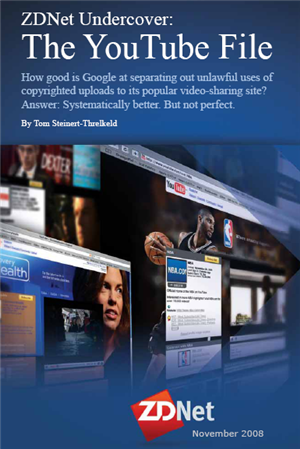YouTube: Does your video ID system really work?

It's been a little more than a year since YouTube announced the launch of its system to identify videos uploaded to its site that contained, without authorization, copyrighted content from television program and movie producers. And it won't be until next year that the $1 billion suit filed by Viacom that alleges continual infringement of its intellectual property by the video-sharing unit of Google gets heard in court.
Viacom still believes thousands of videos infringing on its content get uploaded to YouTube every month (about 12,500). And in the intervening period, YouTube is doing basically nothing to broadcast itself. It does not discuss its system with the press. It has not posted any new videos on how it is policing itself since this short clip, posted on Feb. 2, and since watched about 10,000 times.
Download: YouTube's video ID system: Is 75 percent accuracy good enough? Video ID system cost benefit and revenue calculators. (15-page special report includes: Executive checklists, YouTube's vendors and analysis.)
Meanwhile, Viacom seems to be indicating it may like to monetize pirated clips with its copyrighted content in them. Only it's not doing it with YouTube. It's doing it with YouTube rival MySpace and a start-up called Auditude. MySpace "negotiated a reasonable business deal" with Viacom, said one industry executive Wednesday about the deal. "YouTube never has."Off the record, YouTube tries to intimate that it is now catching about 90 percent of infringing videos, as they get uploaded. Maybe more.
But, absent any kind of public demonstration or publication of verifiable statistics, YouTube has left its efficacy to be left to outsiders to define.
The good news: The content producer which first witnessed and unintentionally abetted, the YouTube phenomenon is now convinced that YouTube's content identification system works, works well and is getting better. It was this "Lazy Sunday" digital short from Saturday Night Live which n 2006 that got millions of views, from an audience not too lazy to share it over YouTube. This is not now on YouTube.
Attesting on YouTube's behalf is NBC Universal, whose general counsel Rick Cotton is on record as assessing YouTube's ability to find infringing videos at 75% to 80% of uploads. NBC's experience is covered in a Special Report,ZDNet Undercover: The YouTube File (PDF download).
But the testaments go both ways. Anvato, a Mountain View, Calif., company which supplies a version of video identification technology that it claims mimics the way humans see images, watched for any and all uploads to YouTube (and three other sites) from July 29 to September that included content that infringed on 12 NBC prime time shows, ranging from "The Office" to "Scrubs" to "30 Rock" to editions of "Law & Order." It found 1,235 infringing videos. And it found that only 37, or 3%, got taken down.
Results for CBS and ABC are also in the Special Report.
Meanwhile, the vice president of business development at The Copyright Clearance Center, Miles McNamee, is even less convinced of the efficacy of YouTube's system, more than a year after it was introduced.
"I don't think they're doing anything at all,'' he told ZDNet. "I think they're full of it."
YouTube says it doesn't have to talk about how well it's doing. Its content partners are happy. Its users are happy. And it knows, it says, that the system is highly effective.
But for a company that urges all its constituents to reveal the most trivial aspects of their lives to the world --"Broadcast Yourself" -- it's revealing that it reveals so little about itself. How difficult could it be to publicly demonstrate what it can catch, if it can catch just about everything, at this point?
Google appears to be trying to cast doubt on Viacom's ire. According to this report, Google, in court filings, says Viacom deliberately (but secretly) had video clips uploaded to YouTube, for promotional purposes, by BayTSP, its "copyright policing service."Uploading videos is easy.
Then comes the fun part: Determining if they can effectively be policed.
YouTube: Broadcast yourself.